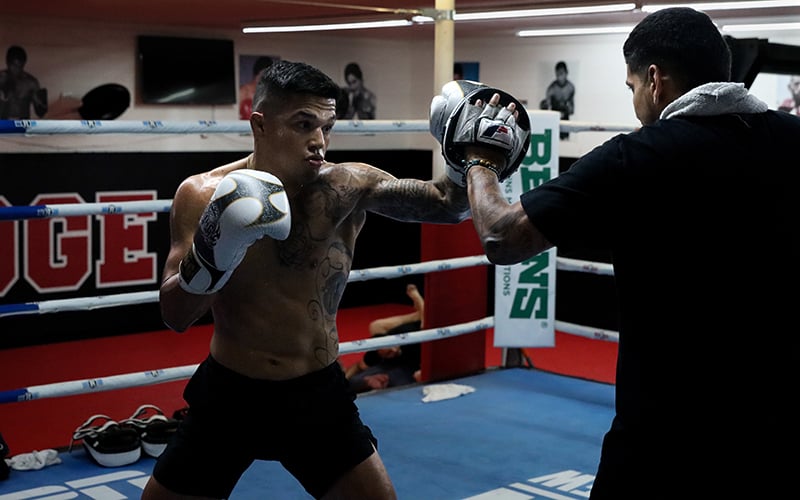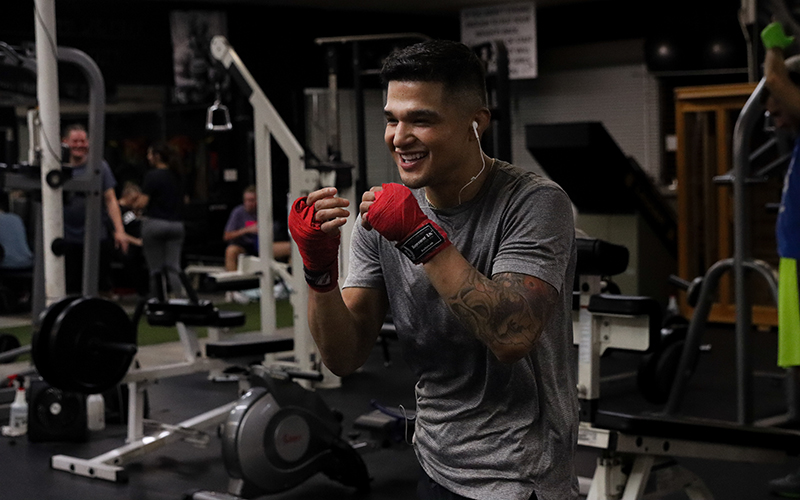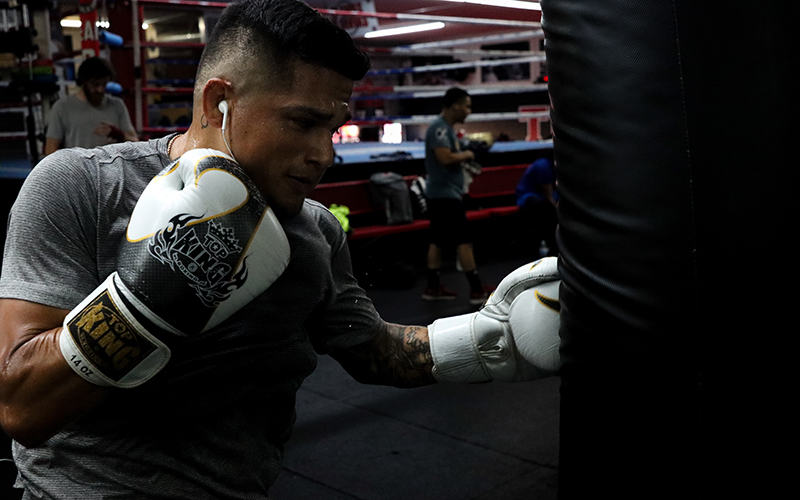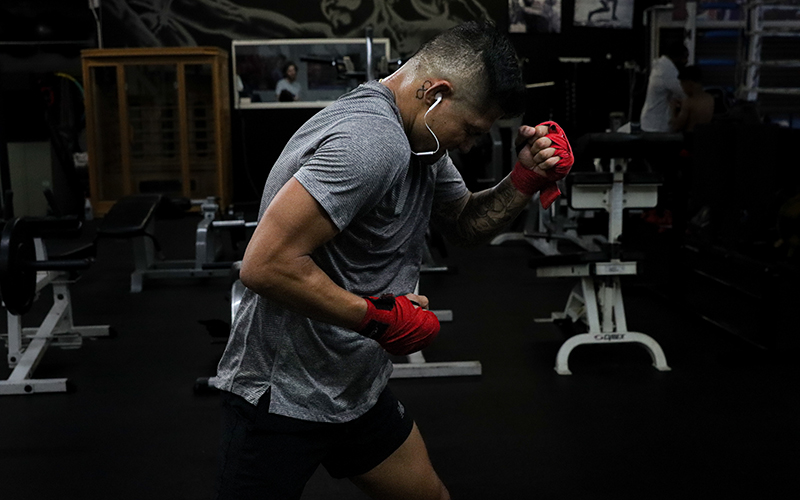
After suffering defeat last October in the UFC’s Contender Series, Reyes Cortez Jr. bounced back with a victory in June at Cage Warriors 139. (Photo by Ruby Arora/Cronkite News)
PHOENIX – Reyes Cortez Jr. watched as his oldest brother, José Cortez, periodically woke up gasping for breath in his bed at Banner-University Medical Center Phoenix.
“It’s like he was running sprints for three hours, but he’s asleep,” Cortez Jr. recalled recently from Pro Edge Boxing MMA & Brazilian Jujitsu in Phoenix, where he trains in hopes of adding another fight (or two) later this year after his win at Cage Warriors 139 in June.
Jose’s cancerous germ cell tumor had worsened over the previous three years, spreading to his lungs. His doctors put Jose under anesthesia to slow his heart to reduce stress on his heart and stabilize his breathing.
However, they could only do so much. José woke up again, gasping for air and in a panic before doctors gave him more anesthesia. Still, even after returning to sleep, his chest heaved as he inhaled and exhaled.
The eyes of Reyes Cortez Sr. filled with tears, and his head dropped as he recalled the last conversation he had with his son earlier that day in 2011. Cortez Sr.’s relationship with his children had become more distant through the family’s hardships, but the father-son bond remained intact to the end.
“Dad, I promise, I swear to God that I’m never going to give up,” Jose said in Spanish as he grabbed his father’s hand. “I’m going to fight with everything I have.”
“I believe you,” Cortez Sr. answered. “You’re a champ.”
Later that day on Jan. 29, 2011, José Cortez died at age 25, leaving behind his parents and three siblings: brothers Abraham and Reyes, and sister Tracy.

Reyes Cortez Jr. is aiming to rise up the ranks in the UFC with another winning bout before the end of this year. (Photo by Ruby Arora/Cronkite News)
The beginning
The Cortezes come from a long bloodline of fighters between the family’s arduous migration from Mexico and three professional mixed martial artists.
José, the family’s first professional fighter, was diagnosed with germ cell cancer shortly after defeating UFC veteran Drew Fickett by a split decision in November 2008. At the time, Cortez Jr. attended Maryvale High School.
“He was so dedicated that he wanted to be the best,” Cortez Sr. said. “And Jose and Junior were really close brothers.”
Cortez Jr., who’s known as Junior, wanted to support José during his chemotherapy sessions, so he stayed beside his brother when he wasn’t training or competing in wrestling. Junior’s days were hard and varied, from sweating on wrestling mats to wiping the sweat off José’s forehead during chemotherapy. But it was more difficult for Junior to see his role model, someone stronger and taller than him, endure so much.
“Junior never talked about (the chemotherapy treatments),” Cortez Sr. said. “I think it was because it was too painful (for him to discuss).”
Yet, José never showed an ounce of fear.
“I’d go through it again,” José would often say, according to his family. “I’d go through it all again, so none of you have to go through this.”
Despite his role of caretaker, Junior won three state championship titles in 2008, 2009 and 2010 and earned a wrestling scholarship to attend Rend Lake College in Illinois.
Abraham emphasized that Junior’s “will to never quit, determination, heart and strong spirit” led him to triumph in the face of adversity. However, Junior left Rend Lake College in his third semester to care for his brother as his cancer worsened. Junior later decided to take a few semesters off from college before transferring to Phoenix College after José’s death to tend to his family, who had also lost its first home due to the high cost of José’s medical bills.
Fighters do not receive health insurance; instead, the MMA promotions often pay the medical bills of the fighter injured during a fight, so José’s medical bills were paid out of the family’s pocket.
However, the toll on the family wasn’t just financial. Three years later, Junior’s parents divorced.
“It was hard for my parents, you know?” Abraham said. “From losing their first kid, their first house, kind of losing everything and trying to put the pieces back together to start over.”
The Cortez family worked through the grief of José’s passing, only to bear witness to their mother, Gloria, enduring a similar journey.

Reyes Cortez Jr. won three Arizona state championship titles and earned a wrestling scholarship to attend Rend Lake College in Illinois. He left the program during his sophomore year and returned home to care for his brother, José. (Photo by Ruby Arora/Cronkite News)
Déjà vu
In early 2015, Gloria was diagnosed with anaplastic thyroid cancer and transferred to the same hospital that treated Jose.
Abraham and Junior were determined to prevent the same fate from happening to their mom, so the brothers started doing extensive research. They looked up different clinics and spoke with Cancer Treatment Centers of America and health specialists to no avail.
The rare cancer spreads rapidly with a prognosis of fewer than six months to live. Gloria was slipping away and transferred to hospice care.
“Hospice is a place where they send patients to slowly and comfortably die,” Junior said. “It was literally the same concept as my brother’s, but just a different type of cancer.”
What wasn’t the same was the Cortez family dynamic following the divorce.
“We grew up in a joint family,” Cortez Sr. said. “A very playful family that didn’t take life so serious. It all changed.”
Cortez Sr. had not seen his kids since 2014, when he and Gloria parted ways, until he arrived at Banner Hospital to see his estranged wife. Gloria did not want to see him, so she asked Abraham and Junior to restrain him from entering her room. As Cortez Sr. approached the entrance, the brothers followed through on their mother’s orders.
“I couldn’t be in Junior’s shoes and (do) what he did because it had to be super hard,” Cortez Sr. said. “He had to grow up really fast, and it must’ve been very tough.”
Cortez Sr. knew he had an estranged relationship with the family, so he didn’t fight it. Instead, he sat in the waiting room, hoping one of his kids would change their minds and let him in. No one did.
“It was hard because that’s my dad, and I’m telling him, ‘No, you can’t come in,’” Junior said.
Still, Cortez Sr. kept coming back, hoping to see Gloria at least once more, and Gloria eventually let him in.
“I wanted to be around them,” Cortez Sr. said. “That’s the woman I spent my last 30 years with and was in love with, and she was dying. It was hard.”
Gloria had designated her three children as her power of attorney, so they made a collective decision on the last moment to say goodbye to their mom. All three had tears streaming down their face.
“Death doesn’t get easier,” Abraham said. “That’s our mom, and we had to decide in our early 20s on what moment would be the last.”
However, before the moment came, Junior made a promise to his mom that changed the trajectory of his life.
“She was someone who always looked over everyone and made sure we’re taken care of,” Junior said. “So I promised my mom that I’d always be there for my brother and sister.
“Fighting just seemed like the easiest route (to make that happen).”
Junior received his associate’s degree in criminal justice from Phoenix College in 2014 and then transferred to ASU. However, he decided to drop out of college and fully pursue his mixed martial arts career, like José and his younger sister, Tracy.
Shortly after his decision, Gloria passed away on Aug. 29, 2015.

Reyes Cortez Jr. promised his ailing mother that he would look after his brother and sister. Fully committing to his professional fighting career was his only option. (Photo by Ruby Arora/Cronkite News)
Starting over (again)
Cortez Sr. went to therapy for two years following Gloria’s death.
“I regret (Gloria) left because I needed her,” Cortez Sr. said. “I needed her with us so (that) we could square everything off. Without her, there wasn’t much I could do anymore.
“I was in pain. I was with her for so long, and she wasn’t here anymore. Even though I (had) already moved on, I didn’t want her gone. I lost her and my son, and my kids didn’t want me around anymore. I was alone.”
Still, Cortez Sr. never gave up.
During the same timeframe, Tracy and Junior channeled their energy into their MMA career.
Tracy began her journey in the UFC with a record of 10-1-0. Junior got off to a 6-2 start, with his last loss coming in the UFC’s Contender Series last October. He bounced back with a win in June at Cage Warriors 139. Without the two knowing, Cortez Sr. would sometimes attend their bouts.
“I wanted to see them and be close to them,” Cortez Sr. said. “But I didn’t want them to see me. It was just easier.
“I had to (love) from a distance because I didn’t want to upset them.”
Despite the distant relationship, Junior respected his father.
“That’s my dad, and I love him,” Junior said. “He and my mom raised me right, and their relationship isn’t something for me, their kid, to be in.”
More recently, Cortez Sr. and Junior had a phone call that lasted two hours – the longest they had spoken in years.
“I thought he’d be the last to understand about what happened,” Cortez Sr. said. “But when I talked to him, he understood so much.
“I miss my sons and my daughter, and I’m proud of them.”
Proud as a father should be.
Junior, who laughs like he’s never endured adversity, holds himself accountable in effort to succeed at the highest level in the UFC, delivering on his promise to his mother.
“It’s not a matter of ‘if’ with (Junior),” Abraham said. “It’s a matter of ‘when.’
“Just wait and watch.”
